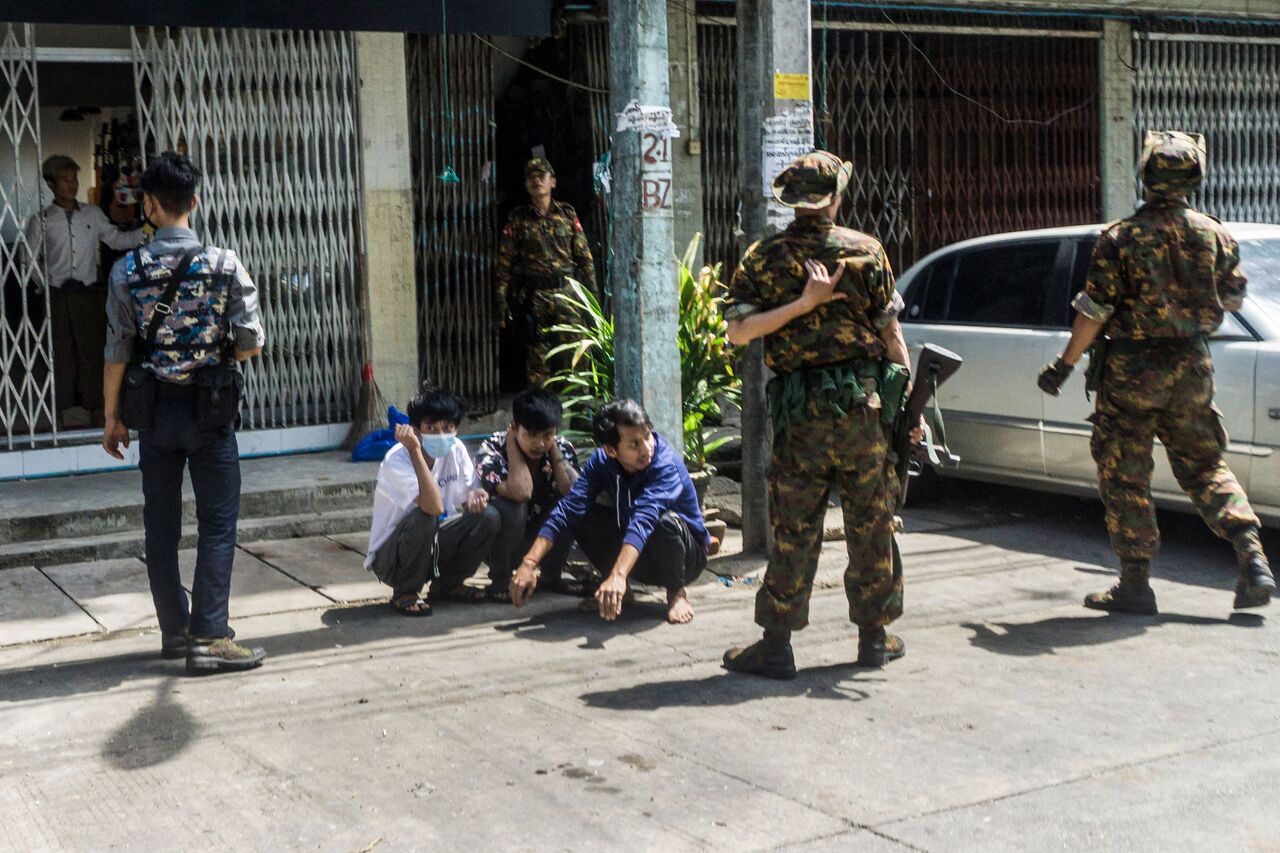Myanmar military once again using fear to control the country
Sign up now: Get insights on Asia's fast-moving developments

Security forces detain people as they search for protesters who were taking part in a demonstration, in Yangon on May 7, 2021.
PHOTO: AFP
YANGON (BLOOMBERG) - Every night at 8pm, the stern-faced newscaster on Myanmar military TV announces the day's hunted.
The mugshots of those charged with political crimes appear on screen. Among them are doctors, students, beauty queens, actors, reporters, even a pair of make-up bloggers. Some of the faces look puffy and bruised, the likely result of interrogations. They are a warning not to oppose the military junta that seized power in a Feb 1 coup and imprisoned the country's civilian leaders.
As the midnight insects trill, the hunt intensifies. Military censors sever the Internet across most of Myanmar, matching the darkness outside with an information blackout. Soldiers sweep through the cities, arresting, abducting and assaulting with slingshots and rifles.
The nightly banging on doors, as arbitrary as it is dreaded, galvanises a frenzy of self-preservation. Residents delete their Facebook accounts, destroy incriminating mobile phone cards and erase traces of support for Myanmar's elected government.
As sleep proves elusive, it's as if much of the nation is suffering a collective insomnia. Little more than a decade ago, the most innocuous of infractions - owning a photograph of pro-democracy leader Aung San Suu Kyi, or an unregistered cellphone, or a single note of foreign currency - could mean a prison sentence.
Some of the military's Orwellian diktats rivalled those of North Korea. Now, three months after Myanmar's experiment in democracy was strangled by the generals' power grab, the sense of foreboding has returned. There is no indication that it will ease.
For the better part of 60 years, the military's rule over Myanmar was animated not by grand ideology but by fear. Today, with much of the population determined to resist the coup makers, a new junta is consolidating its grip by resorting, yet again, to a reign of terror.
"Myanmar is going back to the bad old days when people were so scared that their neighbours would inform on them and they could get arrested for no reason at all," said Mr Ko Moe Yan Naing, a former police officer who is now in hiding after opposing the coup.
The Tatmadaw may have modernised its military arsenal, acquiring Chinese-made weapons and Russian fighter jets. But its propaganda is stuck in a time warp from back when few challenged its narrative. On Wednesday, the State Administration Council, as the junta calls itself, banned satellite TV.
For all the fear percolating in Myanmar, the resistance has only hardened. On Wednesday (May 5), the National Unity Government said it was forming a "people's defence force" to counter the Tatmadaw.
But the Tatmadaw, as the Myanmar military is known, has built an entire infrastructure dedicated to one purpose: perpetuating its power for power's sake.
Its bureaucracy of oppression is formidable. An army of informers, known as "dalan", has reappeared, monitoring whispers and neighbours' movements. And local officials have taken to banging on doors and peering in homes, as a dreaded system of household registration is reintroduced.
Sequestered in military compounds without good Internet access, soldiers have little ability to tap into the outrage of fellow citizens. Still, news does filter in, and some officers have broken rank. In recent weeks, about 80 Myanmar air force officers have deserted and are now in hiding, according to fellow military personnel.
"Politics are not the business of soldiers," said an air force captain who is now in hiding and does not want his name used because his family might be punished for his desertion. "Now, the Tatmadaw have become the terrorists, and I don't want to be part of it."


